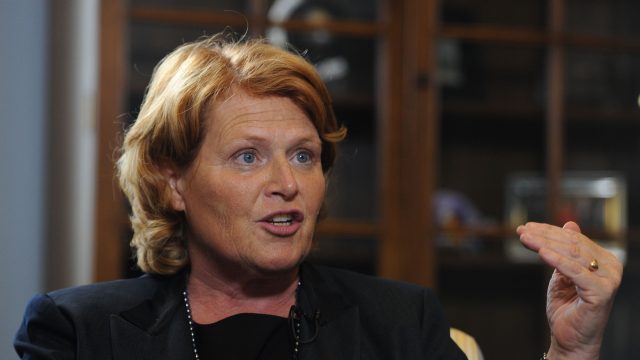Why Does Heidi Heitkamp Hate Free Speech?

S.J. Res. 19 is a “A joint resolution proposing an amendment to the Constitution of the United States relating to contributions and expenditures intended to affect elections,” according to Congress.gov. What it does is create specific authorization in the Constitution allowing for Congress to regulate and limit political speech in the form of spending.
Among its 49 co-sponsors is liberal North Dakota Senator Heidi Heitkamp.
Yesterday this constitutional amendment was brought to the floor of the Senate by Democrats, and among those who voted for cloture to begin debate on it was, again, Senator Heitkamp (though it should be noted that many Republicans voted for cloture as well thinking this debate over the 1st amendment is one they want to have).
Heitkamp, unfortunately, has a long track record of opposing unfettered political speech during her short tenure in the Senate. She has also backed the DISCLOSE Act, which seeks to undermine political activities by private groups by forcing them to expose their contributors. But the DISCLOSE Act is small potatoes compared to what Heitkamp and her fellow Democrats are trying to do to the Constitution.
Why is this such an issue? Here’s the text of the proposed amendment:
While Democrats have couched their argument for this amendment in terms of trying to stop corporate political spending, you’ll note that it authorizes Congress to regulate and limit all types of political spending. It allows Congress to draw distinctions between corporate spending and spending by “natural persons” (but what are corporations if not organizations of people?), but it doesn’t require our legislative branch to do so.
“What’s the big deal,” you may be thinking to yourself. “Congress already restricts how much money Americans can give.”
Here’s the problem:
This amendment gives Congress the authority to limit spending to “influence elections.” We’re not just talking about how much money a given person or corporation or labor union might give a candidate’s campaign or PAC. We’re talking about how much money that individual/corporatation/labor union might spend on their own to influence an election. And while there is a specific prohibition on abridging the freedom of the press, in this era of modern digital media, who is and is not the press?
“But money isn’t speech,” you might say. But money facilitates speech. If you spend money to put up a sign on your property expressing a political point of view? If you buy a newspaper ad to express your point of view? If you buy gas to drive across the state to volunteer for a candidate? That’s spending to influence elections. And it’s not just spending. It’s in-kind contributions. Even if you spend zero dollars expressing your point of view on an election, you still spent your time, and your time has value. Thus, under this amendment, it could be regulated.
Can you imagine an America where the amount of time you can spend expressing your point of view on an election is curtailed by law? Senator Heitkamp wants to allow that sort of thing.
Think of this scenario: A plumber is interested in politics and starts his own political blog to express his point of view. The blog becomes popular, and he spends money on creating content like videos, photos and articles. Currently our politically active plumber, who doesn’t fall into the traditional definition of “the press,” is protected by the 1st amendment. Congress couldn’t step in and count the time and money he spends on his blog as a “contribution” for or against some candidate, because the 1st amendment and reams of political precedent is unambiguous about such restrictions on political speech.
They are not currently allowed.
Yet, with this amendment, our intrepid blogger/plumber would be at risk of legislation curtailing just how much time and money he can spend expressing himself. Would Congress pass that sort of legislation? Maybe, or maybe not. But why would we even want to open the door to that possibility?
Yet opening that door is exactly what Senator Heitkamp has endorsed.
What’s more, the exemption for the press in this amendment makes it worse, not better. By exempting “the press” the amendment asks the court to define who the press is and is not. Under the current 1st amendment, the courts have largely used an expansive definition of “the press” which includes everyone from traditional newspaper reporters to part-time bloggers and citizens with YouTube channels. But a new amendment, giving Congress new authority to regulate political speech but with a specific loophole for “the press,” would require the courts to define “the press.”
Such a definition would narrow our 1st amendment speech rights.
Again, politicians like Heitkamp who support this say they’re doing it to “advance democratic self-government and political equality,” but really what they’re hoping to do is control our national marketplace of ideas in order to protect their own incumbency.
A rule of thumb, for a free people, is that we should always be looking to maximize speech. Better a sprawling, brawling national debate over the issues that allows for unlimited participation than one in which participation is highly regulated.





